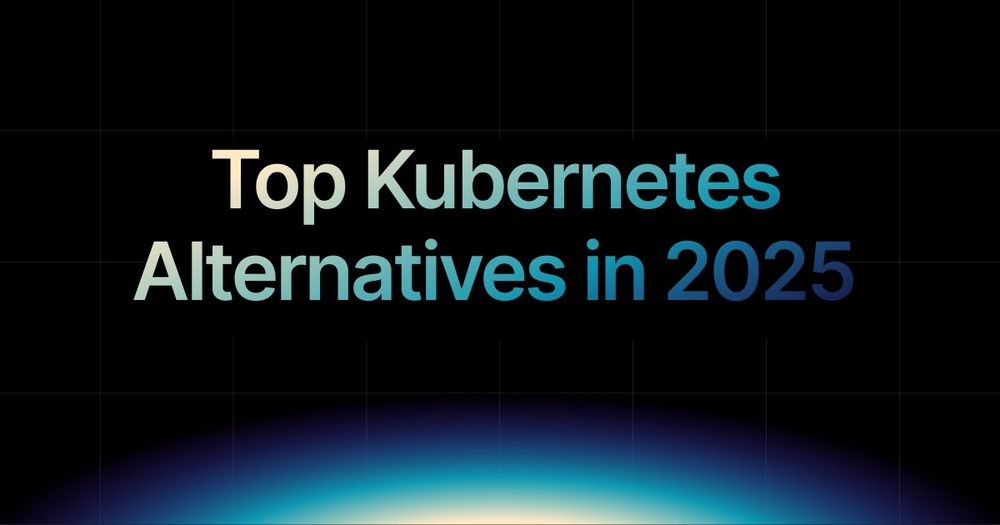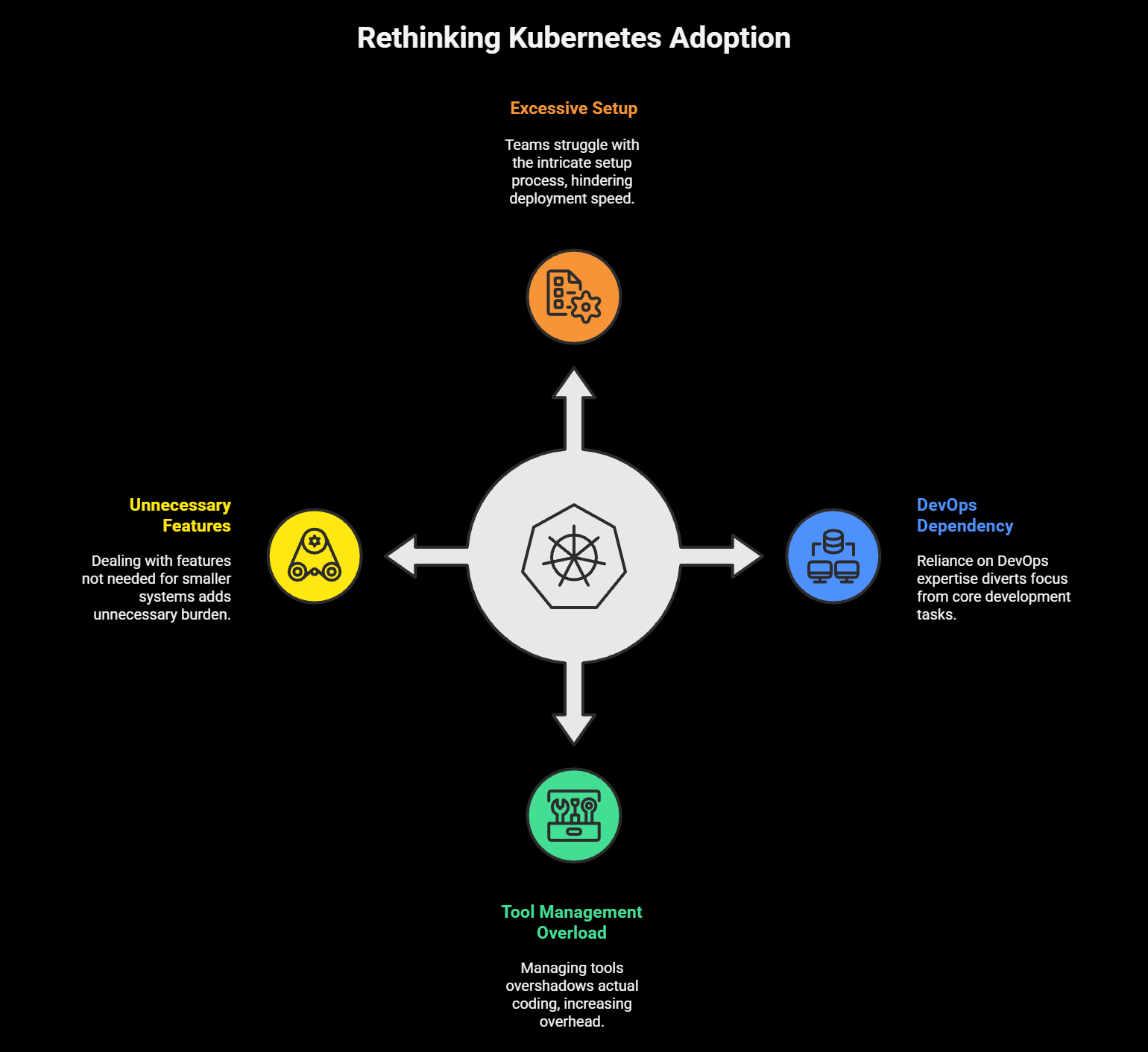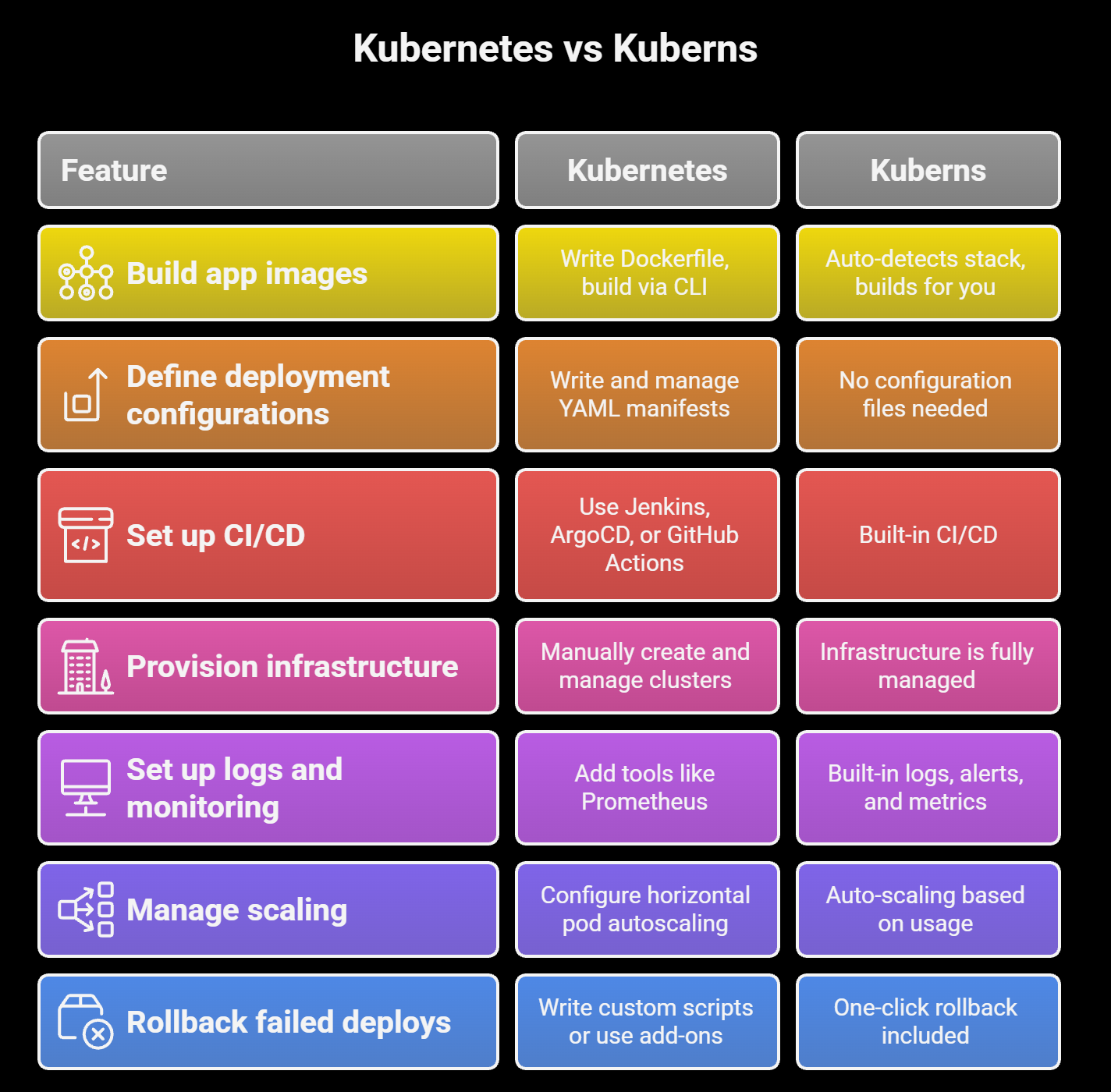Published
- 7 min read
Top Kubernetes Alternatives in 2025

Kubernetes used to be the go-to tool for running and scaling apps. But today, it’s become more of a headache than a help.
Between writing YAML files, managing Helm charts, and spinning up clusters, Kubernetes demands a lot of overhead. It was built for companies operating at hyperscale, not for lean teams, solo devs, or startups who just want to ship features fast.
In 2025, the landscape is shifting. Many developers are asking: “Do we even need Kubernetes anymore?”
The answer for most modern use cases is no.
In 2025, more and more teams are moving away from Kubernetes. Because now, there are tools like Kuberns which completely eliminate the use of Kubernetes by automating that process.
Why Teams Are Rethinking Kubernetes?
 Kubernetes became popular because it offered powerful tools to manage containers at scale. But now, many developers are realizing something: they don’t need that power; they need simplicity.
Kubernetes became popular because it offered powerful tools to manage containers at scale. But now, many developers are realizing something: they don’t need that power; they need simplicity.
Here’s why teams are starting to move away from Kubernetes:
It Takes Too Much Setup
You have to build Docker images, write YAML files, configure clusters, and wire up CI/CD pipelines with other tools like Jenkins or Prometheus. That’s a lot, especially for small teams that just want to deploy fast.
You Need a DevOps Team
Kubernetes assumes you have DevOps engineers or platform specialists who understand infrastructure. Most startups and indie teams don’t. So instead of building features, they get stuck debugging Helm charts or cluster errors.
You End Up Managing Tools, Not Code
Kubernetes doesn’t come with monitoring, rollbacks, or CI/CD built in. You have to set those up yourself. Over time, the toolchain becomes more complex than the app you’re actually building.
It Solves Problems You May Not Have
Unless you’re running large, distributed systems across many environments, you probably don’t need fine-grained orchestration. But with Kubernetes, you still have to deal with it.
Most teams today don’t need Kubernetes. They need to get the code from GitHub to production without the hassle.
Top Kubernetes Alternatives in 2025 (Quick Comparison)
As developers look for easier ways to ship and manage apps, several tools have emerged that reduce or eliminate the need for Kubernetes.
But not all alternatives are equal. Some still require partial setup or separate CI/CD tools. Others are built only for specific use cases.
Here’s a simple breakdown of popular Kubernetes alternatives in 2025 and how they compare:

How Kuberns Replaces Kubernetes Entirely?
Kubernetes is a system for running containerised applications. It gives you control over how your app is built, deployed, scaled, and managed across clusters of servers.
But that control comes with a cost. You need to build Docker images, write YAML files, provision clusters, manage rollouts, wire up monitoring, and connect CI/CD tools, all manually.
Kuberns is not a wrapper around Kubernetes. It’s a fully managed platform that automates the entire Kubernetes workflow, without you having to touch any of it.
Let’s look at what Kubernetes expects you to manage, and how Kuberns replaces it:

Should You Skip Kubernetes Completely?
If you’re using Kuberns, you don’t need Kubernetes at all.
Kuberns handles everything Kubernetes was built for: building, deploying, scaling, and monitoring apps, but without any complexity and manual steps.
There are no clusters to manage, no YAML files to write, and no DevOps setup required.
You get the same end result: your app running in production, scaling automatically, with logs and rollbacks built in.
So if you’re using Kuberns, there’s no reason to spend time learning or maintaining Kubernetes. It’s already done for you. try for yourself
It’s Not About Choosing an Orchestrator Anymore
Kubernetes is no longer a requirement. It’s an overhead.
Kuberns removes the need to think about orchestration entirely. You don’t have to choose between Kubernetes, Nomad, ECS, or any other scheduler. Because Kuberns automates the entire deployment and scaling pipeline for you.
You write code. Push to GitHub. And your app goes live, with zero Kubernetes knowledge required.
The question is no longer “which orchestrator should we use?”
The real question is: “why manage orchestration at all?”
With Kuberns, you don’t have to.
If you’re spending more time managing your tools than shipping code, it’s time to switch.

Frequently Asked Questions
1. What is the best alternative to Kubernetes in 2025?
A: Kuberns is one of the best Kubernetes alternatives in 2025. It replaces the need for Kubernetes entirely by automating builds, deployments, scaling, monitoring, and rollbacks, without requiring YAML, Dockerfiles, or cluster setup.
2. Do I need to know Kubernetes to use Kuberns?
A: No. Kuberns is designed so you never have to interact with Kubernetes or its components. You simply connect your code repo, and everything else from infrastructure provisioning to deployment is handled automatically.
3. Is Kuberns using Kubernetes under the hood?
A: Kuberns uses container orchestration behind the scenes where appropriate, but it abstracts all of it away. You don’t need to install, manage, or even know that Kubernetes is involved.
4. Can Kuberns handle production workloads?
A: Yes. Kuberns is built to run real production apps with built-in CI/CD, auto-scaling, logs, custom domains, SSL, and instant rollbacks. It supports full-stack web apps, APIs, background workers, and more.
5. How is Kuberns different from Heroku or Render?
A: While Heroku and Render simplify parts of the deployment process, Kuberns automates the entire workflow, including CI/CD, infrastructure, scaling, logs, and recovery with no manual configurations. It also gives you more transparency, better performance, and flat pricing with zero platform lock-in.